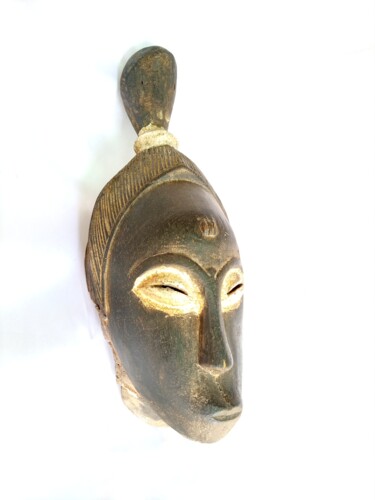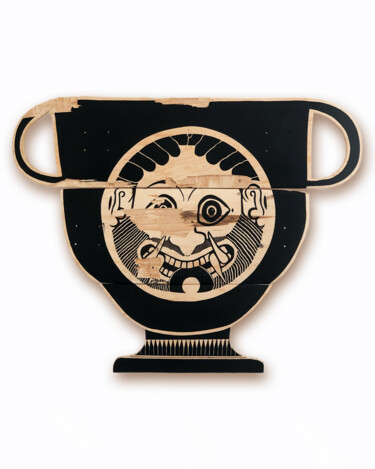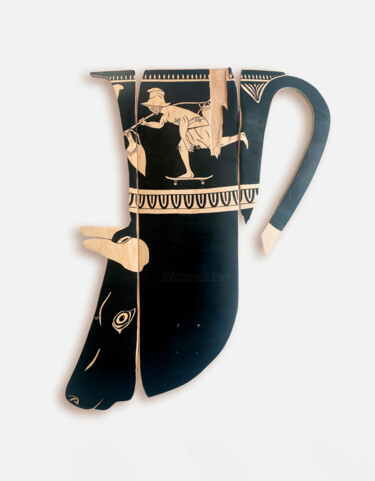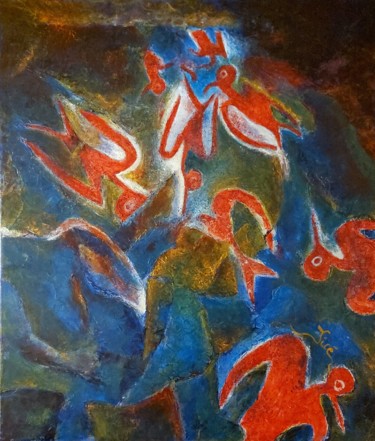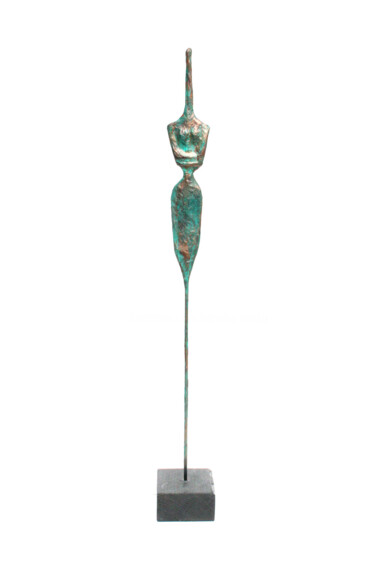
30 Original artworks, Limited Editions & Prints:
Tribal art, also known as non-Western art or ethnographic art, or, controversially, primitive art, is the visual arts and material culture of indigenous peoples. Tribal art frequently has a ceremonial or religious purpose. Tribal art is the theme and craftsmanship of items from tribal civilizations, usually with rural origins. Tribal artworks have historically been gathered by Western anthropologists, private collectors, ethnographic and natural history museums.
Non-Western art was not considered to be art at all by prominent Western art professionals in the 19th century. These items were instead perceived as artifacts and cultural products of "exotic" or "primitive" cultures. But the way that tribal arts are viewed has changed in the second half of the 20th century. Prior to the development of postmodernism in the 1960s, art critics saw tribal arts from a strictly formalist perspective, paying little attention to the work's symbolic meaning, historical or cultural context, or artist's aim. Since then, worldwide collections, exhibitions, and the art market have all begun to place a high value on tribal art, such as African art in Western collections.
The word "tribal" could create a perception of a lower type of art that is connected to primitivism and implies a lack of sophistication in terms of ability, design, intent, or concept. However, as museums reevaluate and re-curate their collections in recognition of the fact that tribal art is far from being crude and primitive and frequently demonstrates a skill of execution that is far beyond what we expect, it is attracting an increasing amount of attention from the general public. It also has the capacity to touch our souls. Perhaps as a result of their compelling presence and emotional energy, our inner instincts are awakened, and we connect with their veracity, fueling our sense of spiritual depth.
Tribal art has three primary categories in museum collections: African art, in particular Sub-Saharan African art, Art of the Americas and Oceanic art, particularly those from Australia, Melanesia, New Zealand, and Polynesia.
African Tribal Art
African tribal art includes stone carvings, wood carvings (masks and sculptures), jewelry, basketry, fabrics, pipes, musical instruments, weapons, beadwork, and the creation of architectural elements like doors and wall ornamentation.
Not all tribes practiced these art forms; the development of these crafts was influenced by the availability of tools, resources, and know-how. The most common material was wood, which was frequently adorned with clay, paints, shells, beads, ivory, metal, feathers, animal hair, raffia, and occasionally even semi-precious jewels.
An all-encompassing religion included African art as an essential component. Individual images served as embodiments or representatives of the vital forces said to be present in all living things. These representations of the dead spoke for them frequently, preserving the essence of tribe ancestry and allowing people to identify with the ancestral spirits. Although many of the forms employed include secular elements, and some works of art are just decorative and ornamental, African tribal artefacts were generally produced as religious art - for a specific ritual or ceremonial use.
Many tribal rituals are based on initiation into age-groups, such as the young men's or old men's "societies," each of which has its own distinct emblems and cult motifs. Many carved figures and masks are associated with such "societies," and frequently symbolize patron Gods or deities like the God of Thunder or the God of Fire. Although certain cultures produced carvings nearly as a luxury item, they are as common and popular as masks and had a ritualistic connection. The Yoruba tribe in Nigeria were expert round figure carvers and frequently crowned their typically huge masks with throngs of intensely alive mannequins, giving the impression that a party was in process. The standard and reputation of African sculpture were so high among other tribes, including the Yoruba, that sculptors might attain a stature and reputation somewhat akin to that of a well-known artist in the West.
Oceanic Tribal Art
Polynesia, Micronesia, Melanesia, and Australasia are the four distinct ethnogeographic regions that make up the Oceania subregion. The creative heritage and customs of the native people who are native to these four locations are referred to as Oceanian tribal art. The majority of Polynesia, Micronesia, and Melanesia were ultimately affected by this Lapita culture. Another factor was the Vietnamese Dong-Son civilisation (c. 600 on), which was a significant trader in the western Pacific region and left behind bronze artifacts that have been discovered all over Oceania.
Oceanic tribal art was bound up with pagan ceremonies involving the supernatural, spirit-worship, fertility, although each region and each island group had its own artistic traditions, which influenced its arts and crafts. The majority of the materials used by artists and craftsmen were perishable, a fairly wide spectrum of art was produced, including body painting, tattooing, painting, sculpting, wood carving, and textile art. Thus, relatively few examples, aside from stone structures and sculpture, have survived.
Famous examples of Polynesian art that have survived include the stone temples of the Society Islands, Easter Island, and the Marquesas; the monumental stone sculptures (moai) on Rapa Nui/Easter Island and the Marquesas, exemplifying the use of designs incorporating anthropomorphic figures with protruding tongues and bulging eyes, common to many eastern and remote areas of Polynesia; and highly ornamented bark cloth in western Polynesia.
Masks were a major theme in indigenous art throughout Melanesia because they were employed in intricate pagan rituals and cult practices. In addition to body painting and tattooing, Micronesian tribal artifacts include styled wooden masks, painted canoes, and carved wooden bowls. The diverse forms and media of Australian Aboriginal art include body painting, rock painting, bark painting, rock engravings, standing stones, carving, sculpture, and ornamental adornments on implements and weapons.
Native American Tribal Art
The nomadic, hunter lifestyle of the former and the slightly more static but nonetheless destitute environment of the latter have greatly influenced American Indian art. Resources availability, including wood, wicker, metal, animal bone, clay, and cotton were another important factor in how locally specific creative traditions emerged.
Tribes in the southwest were masters of weaving, pottery production, and fresco painting. These tribes included the Hohokam of southern Arizona, the Ansazi of northern Arizona and New Mexico, the Mimbres of south-west New Mexico, as well as the Zuni, Navaho, and Hopi peoples. Southwest Native Americans developed sandpainting, commonly referred to as dry painting (notably the Navajo).
In the Midwest, culture was created completely by tribe, and it was renowned for both its elaborate textile art and its well-known earthworks, known as "effigy mounds," that were shaped like various animals. In addition to carved wood bowls and polished stone and copper ornaments, tribal art also included sculptured stone pipes with motifs ranging from the ultra-realistic to the abstract.
Finely carved shells, ornately painted clothing accessories, and pipes shaped like birds and animals were also created in the South-East region. However, despite using poor-quality clay, it was best known for its beautiful pottery. For ceremonial, religious, and personal usage, pottery works were made and decorated in a variety of floral and geometric patterns.
Basketry was a prime example of Native American art on the West Coast, specifically in California. The Northeastern Indians, especially the Iroquois, were renowned for their hardwood bowls, woven wampum belts, porcupine quillwork, and False Face Society masks. The Northwest's greatest tribal art was sculpture, especially wood carving. One of the most prevalent types of hand-carved sculptures were totems, little wooden figures, and masks that were meticulously painted and frequently inlaid with stones and abalone shells.
Influence on Modern Art
From the middle of the 19th century onward, as more and more expeditions brought back tribal artifacts, European collectors and artists began to show an interest in what was then known as primitivism/primitive art, which was typically the art of black Africa. The late 19th and early 20th centuries witnessed significant tribal art exhibitions that introduced non-Western art to the Western art world. The Museum of Modern Art featured important exhibitions such the 1941 Indian Art of the United States and the 1935 Africa Negro Art. Many contemporary artists, including Expressionists, Cubists, and Surrealists, have found inspiration from exposure to tribal arts.
Major artists like Vincent Van Gogh and Henri Matisse had been profoundly impacted by tribal art, while Paul Gauguin had firsthand contact with it in French Polynesia. They were followed by Pablo Picasso in the middle of the 20th century, whose famous early Cubist masterpiece Les Demoiselles d'Avignon prominently featured African masks. Cubism was greatly influenced by tribal art. Drawing primarily on the formal implications of tribal art, the artist quickly damaged the Western paradigm by fracturing the image and sacrificing perspective. One of the main outcomes of this was abstract painting.
Around this time, the German collective Die Brücke started concentrating more on the intuitive, primitive, and ritualistic aspects of non-Western art, launching the important modern art style known as Expressionism. By drawing influence from tribal art, Cubism, and Expressionism in Zürich, New York, and finally Paris, the Dadaists contributed to the dismantling of the Western paradigm. The three-dimensional counterpart of collage and assemblage was largely used in Dada's pictorial or sculptural work. This piece made from recycled materials proves that art can be made out of anything and isn't limited to being painted, carved, or modeled. Its imagery was provocative on a political, social, or aesthetic level and frequently combined elements of tribal art. Dada introduced the ideas that eventually gave rise to conceptual art. Conceptual art's influence merged with those of the other streams of modern art to form the large, broad, extraordinarily rich, varied, and internationally diversified river of contemporary art that the world presently enjoys.
Discover contemporary Artworks on Artmajeur
Contemporary art is a vibrant constellation of artistic expressions. This creative universe encompasses a wide array of mediums, from paintings, sculpture, and photography to drawing, printmaking, textile art, and digital art, each medium a star shining with its own distinct radiance. Artists use diverse supports and materials to bring their visions to life, such as canvas, wood, metal, and even innovative digital canvases for the creation of virtual masterpieces.
A contemporary painting, for instance, may weave its story through the masterful strokes of acrylic or oil, while a contemporary sculpture might sing its song in the language of stone, bronze, or found objects. The photographic arts capture and manipulate light to produce striking images, while printmaking employs techniques like lithography and screen-printing to produce multiples of a single, impactful image. Textile art plays with fabrics and fibers, whereas digital art pushes the boundaries of creation with innovative technology.
The allure of contemporary art lies in its boundary-pushing nature, its relentless quest for experimentation and its constant reflection of the evolving human experience. This boundless creativity, coupled with its strong social and personal commentary, makes every piece of contemporary art a unique emblem of its time, a mirror held up to the realities and dreams of our complex world. It whispers to us, moves us, provokes thought, and kindles a deep emotional response, stirring the soul of anyone willing to listen. It is, indeed, the language of emotions and ideas, spoken in the dialect of our era.

©2023 Vanessa Renoux
Origins and history of contemporary art
The story of contemporary art unfolds in the mid-20th century, marked by seismic shifts in artistic expression. Post-World War II, around the 1950s and 1960s, artists began experimenting beyond traditional confines, challenging the norms of what art could be. This revolutionary epoch birthed myriad new movements and artistic forms such as abstract expressionism, pop art, and minimalism. Paintings, once confined by realism, embraced abstraction, as artists used color and form to express emotions and ideas. Notable periods like the advent of pop art in the late 1950s and early 1960s saw artworks mimicking popular culture and mass media, reflecting society’s shifting focus.
The sculptural arts, too, witnessed a metamorphosis. Sculptors started to experiment with new materials and forms, often creating artworks that interacted with the viewer and the surrounding space, fostering a sense of engagement. Drawing, a timeless practice, also evolved, with artists incorporating innovative techniques and concepts to redefine its role in contemporary art.
Photography, a relatively new medium, emerged as a powerful tool in the contemporary art landscape. Born in the 19th century, it truly came into its own in the latter half of the 20th century, blurring the lines between fine art and documentation. Printmaking, a practice dating back to ancient times, saw renewed interest and experimentation with techniques like lithography, etching, and screen printing gaining prominence.
The realm of textile art expanded dramatically, as artists began to appreciate the versatility and tactile quality of fabric and fibers. Artists began using textiles to challenge the boundaries between fine art, craft, and design.
The dawn of digital technology in the late 20th century heralded a new age for contemporary art. Digital art emerged as artists started leveraging new technologies to create immersive, interactive experiences, often blurring the line between the virtual and the physical world.
Through these transformative periods, the essence of contemporary art has remained the same: a dynamic, evolving reflection of the times we live in, continually pushing boundaries and embracing the new, always questioning, always exploring.

©2022 Luiz Carlos Guarilha
Evolutions of theses contemporary works in the art market
As we navigate through the 21st century, the dynamic landscape of contemporary art continues to evolve and expand, reflecting our ever-changing world. Contemporary paintings, once primarily confined to two-dimensional canvases, now embrace a multitude of forms and techniques, ranging from mixed media installations to digital creations, each piece a rich a weaving of thoughts, emotions, and narratives. Sculpture, too, has ventured far beyond traditional stone and bronze, with artists incorporating light, sound, and even motion, embodying the ephemerality and flux of the modern world.
Photography, in the hands of Contemporary Artists, has expanded its horizons, seamlessly blending with digital technology to create breathtaking imagery that challenges our perception of reality. Drawing, as well, has transcended the borders of paper, incorporating multimedia elements and exploratory techniques to redefine its role in the artistic discourse. Printmaking continues to flourish, with contemporary artists using traditional methods in innovative ways to deliver potent social and personal commentaries.
Textile art, once considered a craft, now holds a prominent place in the contemporary art world, with artists using it to explore issues of identity, tradition, and cultural heritage. Meanwhile, digital art, the newest member of the contemporary art family, has revolutionized the way we create and interact with art, presenting immersive experiences that blur the boundary between the virtual and the physical.
These diverse forms of contemporary art hold significant value in the current art market, not only due to their aesthetic appeal but also their ability to encapsulate and communicate complex ideas and emotions. Collectors, curators, and art lovers worldwide seek these works, drawn to their inherent dynamism, their innovative use of materials, and their eloquent expressions of our shared human experience. As a testimonial to our times, these contemporary artworks encapsulate the pulse of our society and the resonance of individual voices, forever etching our collective narrative into the annals of art history.
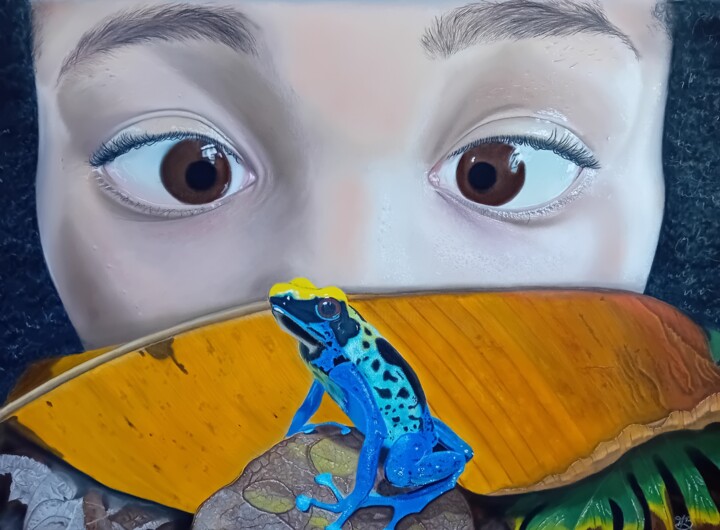
©2024 Maud Berhault
Famous Contemporary Artists
As we delve into the vibrant realm of contemporary art, we encounter an array of artists who shape this dynamic field. Each a master in their medium - painting, sculpture, photography, drawing, printmaking, textile, or digital art - they push artistic boundaries, reflecting our era and challenging perceptions. Let’s explore these remarkable contributors and their groundbreaking works.
1. Gerhard Richter - Known for his multi-faceted approach to painting, Richter challenges the boundaries of the medium, masterfully oscillating between abstract and photorealistic styles. His works, whether featuring squeegee-pulled pigments or blurred photographic images, engage in a fascinating dialogue with perception.
2. Jeff Koons - A significant figure in contemporary sculpture, Koons crafts monumental pieces that explore themes of consumerism, taste, and popular culture. His iconic balloon animals, constructed in mirror-polished stainless steel, captivate with their playful yet profound commentary.
3. Cindy Sherman - An acclaimed photographer, Sherman uses her lens to explore identity and societal roles, particularly of women. Renowned for her conceptual self-portraits, she assumes myriad characters, pushing the boundaries of photography as a medium of artistic expression.
4. David Hockney - Hockney, with his prolific output spanning six decades, is a pivotal figure in contemporary drawing. His bold use of color and playful exploration of perspective convey an intoxicating sense of joy and an unabashed celebration of life.
5. Kiki Smith - An innovative printmaker, Smith’s work explores the human condition, particularly the female body and its social and cultural connotations. Her etchings and lithographs speak to universal experiences of life, death, and transformation.
6. El Anatsui - A master of textile art, Anatsui creates stunning tapestry-like installations from discarded bottle caps and aluminum scraps. These shimmering, flexible sculptures blend traditional African aesthetic with contemporary art sensibilities, speaking to themes of consumption, waste, and the interconnectedness of our world.
7. Rafael Lozano-Hemmer - A leading figure in digital art, Lozano-Hemmer utilizes technology to create interactive installations that blend architecture and performance art. His work, often participatory in nature, explores themes of surveillance, privacy, and the relationship between people and their environments.

©1982 Percy Martin
Notable contemporary artworks
The contemporary art landscape is a dynamic patchwork of diverse expressions and groundbreaking ideas, each artwork a unique dialog with its audience. Here are a selection of some renowned contemporary artworks, spanning various media such as painting, sculpture, photography, drawing, printmaking, textile art, and digital art, that have profoundly influenced this vibrant movement.
"Cloud Gate" by Anish Kapoor, 2006 - This monumental stainless steel sculpture, also known as "The Bean," mirrors and distorts the Chicago skyline and onlookers in its seamless, liquid-like surface, creating an interactive experience that blurs the line between the artwork and the viewer.
"Marilyn Diptych" by Andy Warhol, 1962 - An iconic piece of pop art, this silkscreen painting features fifty images of Marilyn Monroe. Half brightly colored, half in black and white, it reflects the dichotomy of celebrity life and its influence on popular culture.
"Rhein II" by Andreas Gursky, 1999 - This photographic artwork, a digitally-altered image of the Rhine River, is celebrated for its minimalist aesthetic. It strips the landscape to its bare essentials, invoking a sense of tranquility and vastness.
"Black Square" by Kazimir Malevich, 1915 - A revolutionary painting in the realm of abstract art, this piece, featuring nothing more than a black square on a white field, challenges traditional notions of representation, symbolizing a new era in artistic expression.
"Puppy" by Jeff Koons, 1992 - This giant sculpture, a West Highland Terrier blanketed in flowering plants, explores themes of innocence, consumer culture, and the interplay between high art and kitsch. It’s a delightful blend of traditional sculpture and garden craft.
"Re-projection: Hoerengracht" by Ed and Nancy Kienholz, 1983-1988 - A room-sized tableau representing Amsterdam’s red-light district, this work combines elements of sculpture, painting, lighting, and found objects. It engages viewers in a stark commentary on commodification and objectification.
"Untitled" (Your body is a battleground) by Barbara Kruger, 1989 - This photomontage, combining black-and-white photography with impactful text, explores issues of feminism, identity, and power. Its potent, confrontational message is a prime example of the power of text in contemporary visual art.
"For the Love of God" by Damien Hirst, 2007 - This sculpture, a platinum cast of a human skull encrusted with 8,601 diamonds, probes themes of mortality, value, and the human fascination with luxury and decadence. It’s a compelling blend of macabre and magnificence.
"Physical impossibility of Death in the Mind of Someone Living" by Damien Hirst, 1991 - This artwork, featuring a tiger shark preserved in formaldehyde, blurs the line between traditional sculpture and biological specimen. It prompts viewers to contemplate mortality and nature’s ferocity.
"One and Three Chairs" by Joseph Kosuth, 1965 - A piece of conceptual art, it presents a physical chair, a photograph of a chair, and a dictionary definition of a chair, thus exploring the relationship between language, picture, and referent in art.
These pieces, in their diversity, exemplify the rich tapestry of contemporary art, each piece a unique commentary on our world and a testament to the limitless potential of creative expression.

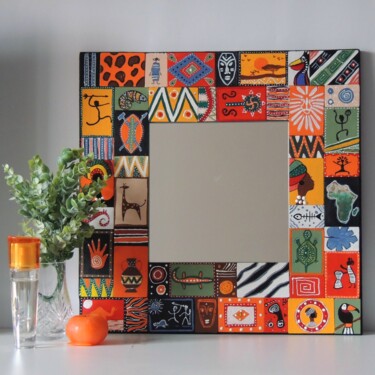
Ekaterina Nesterova
Design | 15.8x15.8 in
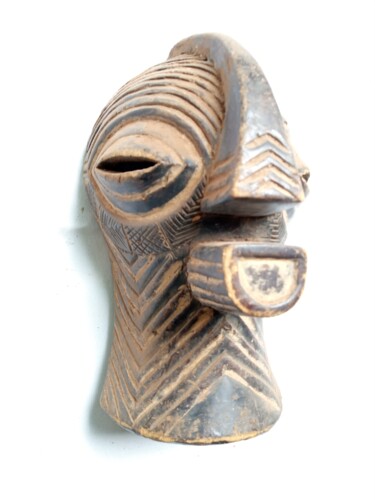
Jafeth Moiane
Sculpture - Wood | 13x7.1 in
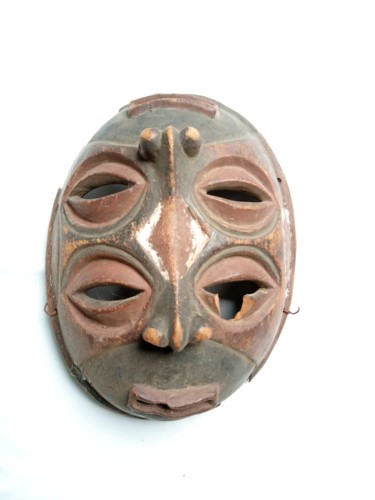
Jafeth Moiane
Sculpture - Wood | 13.8x10.6 in
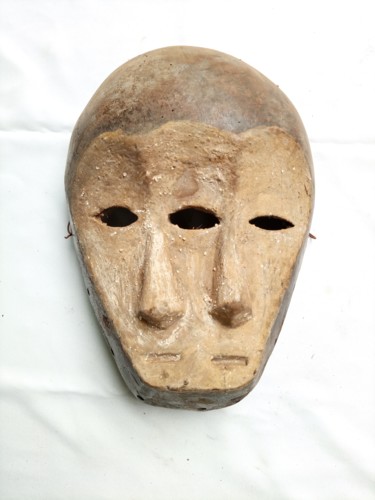
Jafeth Moiane
Sculpture - Wood | 14.2x9.8 in
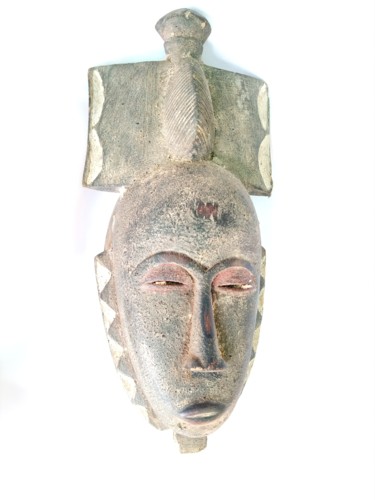
Jafeth Moiane
Sculpture - Wood | 13.4x7.5 in

Percy Martin
Printmaking on Paper | 24x18 in
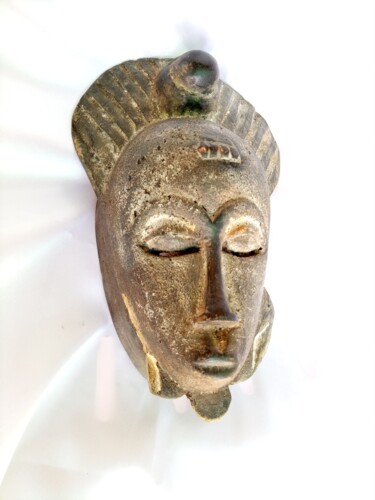
Jafeth Moiane
Sculpture - Wood | 13.4x8.3 in

Jafeth Moiane
Sculpture - Wood | 14.6x7.5 in
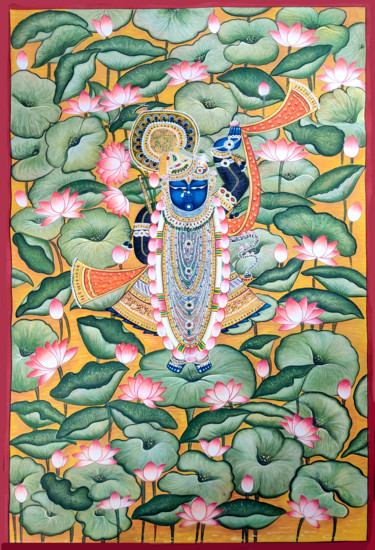
Nilesh Soni
Watercolor on Fabric | 32x20 in
